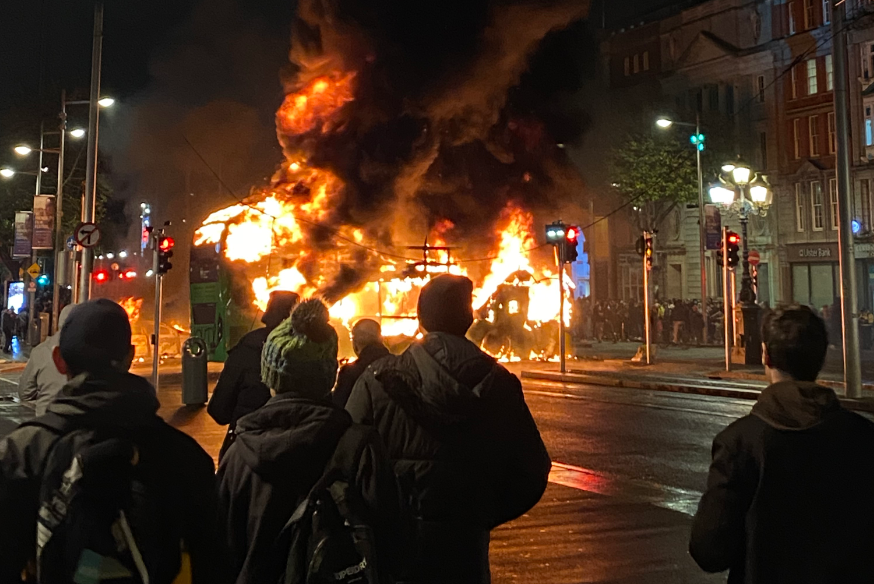Last Thursday, three children and one adult were stabbed in broad daylight outside of a school in Dublin, Ireland, by an Algerian immigrant. Hundreds took to the streets around the scene of the crime that night to protest the stabbing, with a number of individuals burning vehicles and engaging in violent confrontations with riot police. At least 34 people were arrested and charged with riotous behavior, assault, and theft.
Without missing a beat, Irish officials and media labeled both the protest and riot “far-right,” driven by anti-immigrant hatred. The international martial artist superstar and known Irishman, Conor McGregor, balked at these characterizations and made a number of statements on X expressing his views:
Now, according to "The Sunday Times,” McGregor is being investigated by the Irish police in an “inquiry into the dissemination of online hate speech” despite condemning illegal activity. This comes as Ireland’s Prime Minister Leo Varadkar announced on Friday that the government would be prioritizing new legislation in response to the riots that would authorize police to use facial recognition software to identify suspects and also “modernize” hate speech laws in the country.
In a press conference, Varadkar appeared more displeased with the protestors and rioters than the attempted murder of children, stating:
“To all those cowardly champions of Ireland who took to the streets of Dublin last night, let me say one thing. Ask your sisters, ask your friends, ask everyone you know what they fear most on our streets. They’re afraid of you. They’re afraid of your anger and your rage. They’re afraid of your violence, your hate, and how you blame others for your problems.”
While rioting and looting should not be tolerated, I’m reminded of a joke by the late, great Norm Macdonald:
What terrifies me is if ISIS were to detonate a nuclear device and kill 50 million Americans. Imagine the backlash against peaceful Muslims?
— Norm Macdonald (@normmacdonald) December 16, 2016
The events in Ireland matter in America more than we might realize, as freedom of speech is always the first on the chopping block of power-hungry regimes. “Hate speech” legislation is one of the most powerful tools for controlling the speech (and thereby thought) of the people because “hate speech” sounds bad and thus laws against hate speech sound like something on which everyone should agree.
Therein lies the great danger of such social engineering. Whoever gets to define “hate speech” under the law has the power to dictate the bounds of legal and illegal speech. This is why in America, the United States Supreme Court has repeatedly ruled that there is legally no such thing as “hate speech” under the First Amendment. As recently as 2017, in the case Matal v. Tam, a unanimous Supreme Court ruled that a provision in trademark law that barred “disparaging” speech was invalid under the First Amendment.
Writing for the majority opinion, Justice Alito wrote:
“Speech that demeans on the basis of race, ethnicity, gender, religion, age, disability, or any other similar ground is hateful; but the proudest boast of our free speech jurisprudence is that we protect the freedom to express ‘the thought that we hate.’”
However, despite this case law preventing “hate speech” legislation, we must still be vigilant about the current attacks on free speech in America. Take for example, the case of Douglass Mackey, who was recently sentenced to seven months in prison, a $15,000 fine, and two years of probation for tweeting a meme that joked you could vote by text for Hillary Clinton during the 2016 presidential election. Despite the prosecution failing to provide a single instance of a citizen who claimed to have had their vote deprived by the meme, Mackey was nevertheless found guilty of conspiracy to engage in election interference. The law at issue is a 150-year-old statute that was passed to allow prosecution of voter intimidation by the Klan during Reconstruction.
Far from standing outside a polling place with a weapon as contemplated by the law, Mackey simply posted a prank meme on social media for all to see. A mere seven days into the Biden administration, charges were brought against Mackey for the offense of posting a meme.
Mackey’s case is currently on appeal in the 2nd U.S. Circuit Court of Appeals, and I look forward to filing a brief on behalf of the Foundation for Moral Law as amicus curiae in defense of free speech.
In countries around the world, free speech is already dead. If you can be arrested for a meme, then the reigning government will find a reason, any reason, to arrest those who dissent. Here at home, we cannot let freedom of speech die quietly in the night.
Talmadge Butts is Lead Staff Attorney for the Foundation for Moral Law (www.morallaw.org). Those with constitutional concerns may call the Foundation at (334) 262-1245 or email talmadge@morallaw.org.
The views and opinions expressed here are those of the author and do not necessarily reflect the policy or position of 1819 News. To comment, please send an email with your name and contact information to Commentary@1819news.com.
Don’t miss out! Subscribe to our newsletter and get our top stories every weekday morning.










